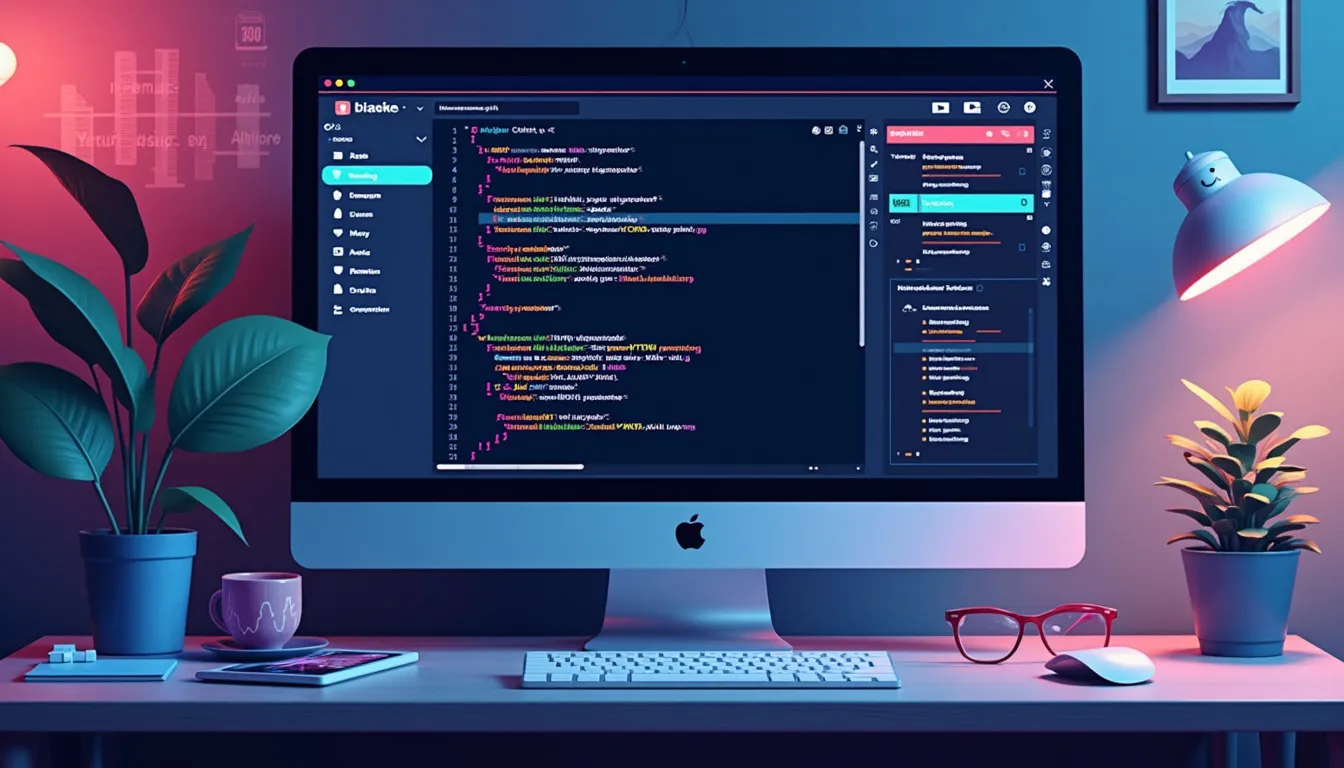In today’s digital landscape, knowing how to monetize a personal blog has become a crucial skill for both novice and seasoned bloggers alike. What once began as an online journal can now evolve into a profitable venture, provided that one knows the right avenues to explore. Blog monetization goes beyond merely setting up an ad display network and hoping for the best. It involves a blend of creativity, strategic planning, and a deep understanding of your audience. Why is it important to learn how to monetize a personal blog? Because this knowledge unlocks the potential for financial independence and turns a passion project into a sustainable income source.
Setting realistic expectations is the cornerstone of successful blog monetization. While tales of overnight success are enticing, they often overshadow the dedication and perseverance required to build a revenue-generating blog. It’s vital to approach blog earnings with a pragmatic mindset. Think of it as cultivating a garden: the seeds you plant today may take time to grow, but with consistent effort and the right strategies, your blog can flourish into a rewarding enterprise. In this comprehensive guide, we will explore various strategies to monetize your blog effectively, ranging from diversifying income streams to leveraging email marketing. By the end, you’ll be equipped with actionable insights to boost your blog’s earning potential, all while maintaining a connection with your readers that is both genuine and engaging.
Join us as we navigate the myriad ways to transform your personal blog into a profitable platform, while keeping the essence of why you started blogging alive. Whether you’re aiming to cover your hosting costs or dreaming of a full-time income, the journey to monetize your blog begins here. And remember, even amidst the hustle of monetization, never lose sight of the joy and authenticity that brought you to the world of blogging in the first place. Let’s dive in!
Introduction to Blog Monetization
Overview of Blog Monetization
Blog monetization is the process of converting a blog’s content and traffic into revenue. The concept might seem daunting at first, but understanding the various methods to monetize your blog can make the process more manageable. From advertising networks to sponsored content, knowing the options available and how to leverage them effectively is crucial.
It’s important to remember that monetizing a personal blog doesn’t happen overnight. It requires consistent effort, strategic planning, and, most importantly, patience. Before diving into specific strategies, it’s essential to have a foundational knowledge of blog monetization. This overview aims to equip you with that initial understanding, preparing you to explore more detailed methods later.
Importance of Understanding How to Monetize a Personal Blog
Your personal blog is more than just a platform for sharing your thoughts and experiences; it has the potential to become a meaningful source of income. But without a clear understanding of how to monetize a personal blog, you might miss out on valuable opportunities. Let’s face it, not everyone who starts blogging is familiar with the different ways to generate revenue. You might be passionate about creating content, but uncertain about how to translate that passion into profits.
Understanding blog monetization involves recognizing the diverse ways your blog can generate income, identifying the methods that align with your content and audience, and implementing best practices to maximize your earnings. Take it from someone who has balanced a full plate of responsibilities, both professionally and personally. Whether it was devising safety strategies in challenging environments or navigating the intricate nuances of AI, the principle remained the same: knowledge is power. The better informed you are, the better equipped you’ll be to make decisions that push you closer to your financial goals.
Setting Realistic Expectations for Blog Earnings
As exciting as blog monetization sounds, setting realistic expectations can save you from potential disappointment. It’s easy to be swayed by success stories of bloggers making a fortune within months, but those cases are exceptions rather than the rule. For most, the journey to significant earnings is gradual.
For instance, Joe, a friend and fellow blogger, started his personal finance blog with high hopes. Inspired by stories of six-figure incomes earned through blogs, Joe was eager to quit his day job within a year. However, two years down the line, he was only making a modest income, far from his initial expectations. This experience taught Joe the importance of patience, consistency, and, most crucially, setting achievable goals.
Think of blog monetization as akin to a weight loss journey—a topic close to my heart. Just as sustainable weight loss requires realistic timelines, consistent effort, and incremental goals, blog earnings need a similar approach. Start by identifying your target earnings, then break them down into smaller, manageable milestones. Celebrate each milestone, and use it as a stepping stone towards your ultimate goal.
In summary, understanding the basics of blog monetization sets the stage for your success. Recognize the importance of being well-informed, remain patient, and set realistic expectations. These foundational elements will prepare you to dive into specific strategies to monetize your personal blog, ensuring a clearer and more achievable path to your financial objectives.
The journey to monetizing a personal blog may be filled with ups and downs, but by acknowledging these key points, you’re already a step ahead. Remember, every successful blogger started right where you are now. So, equip yourself with the right knowledge, set those realistic expectations, and get ready to transform your personal blog into a rewarding venture.

Strategies to Monetize a Personal Blog
Diversifying Income Streams
When it comes to how to monetize a personal blog, diversifying your income streams is paramount. Just like any investment portfolio, relying on a single source of income can be risky. It is essential to incorporate various strategies to ensure a steady flow of revenue.
Take for example, Jane, who runs a successful lifestyle blog. Initially, she relied solely on Google AdSense. While beneficial, there were months when the ad revenue dipped significantly. By diversifying with additional affiliate marketing, online courses, and sponsored content, she managed to stabilize her income and protect against fluctuations in any one income stream.
Consider examining multiple avenues such as ad networks, affiliate marketing, sponsored posts, and selling products. Each of these streams can contribute to a more stable and sustainable blogging business, providing you with a cushion against market shifts and changes in platform policies.
Utilizing Advertising Networks
Advertising networks are often the first step for bloggers exploring how to monetize a personal blog. Platforms like Google AdSense, Mediavine, and AdThrive can help you earn money by displaying ads to your readers. These networks essentially match advertisers with your blog, based on your content and audience’s interests.
For instance, a technology blog might automatically feature ads for the latest gadgets or software. This service is straightforward and requires minimal effort once set up, though it’s important to note that earnings will vary based on your blog’s traffic and audience engagement.
While these networks can provide a steady trickle of income, it is crucial to balance ad placements with user experience. Overloading your blog with ads can deter readers and potentially hurt your site’s credibility. Strategic placement and ad optimization can enhance user engagement and boost overall revenue without compromising quality.
Sponsored Content and Brand Collaborations
Sponsored content and brand collaborations offer another lucrative avenue for monetizing a blog. Companies are constantly looking for authentic voices to promote their products, and your blog could be the perfect platform. This type of collaboration usually involves writing posts or creating content about a brand’s product or service, for which you get compensated.
Consider the case of Mark, who runs a food blog. By collaborating with kitchen appliance brands and food ingredient companies, he not only increased his blog’s visibility but also generated substantial income. These collaborations worked because they were relevant to his niche and valuable to his readers.
For a successful partnership, it is crucial to choose brands that align with your blog’s niche and audience interests. Authenticity is key—a genuine endorsement from a trusted blogger can be far more effective than a traditional advertisement. Negotiating fair compensation and delivering quality content will set the foundation for long-term collaborations.
Affiliate Marketing Programs
Affiliate marketing is a powerful tool in the arsenal of anyone looking to learn how to monetize a personal blog. This involves promoting products or services on your blog and earning a commission for any sales generated through your referral links. Popular platforms like Amazon Associates, ShareASale, and CJ Affiliate make it easy to find products relevant to your content.
Let’s discuss Sarah, a travel blogger who writes extensively about her adventures. By including affiliate links to travel gear, booking sites, and destination guides, she adds value to her readers while earning commissions on sales. This seamless integration of affiliate links with useful content helps build trust and increases the likelihood of reader purchases.
The key to successful affiliate marketing is transparency and relevance. Clearly disclose affiliate links to your audience and focus on promoting products that genuinely enhance their experience. Also, diversifying your affiliate partnerships can prevent over-reliance on a single source of income.
Finally, tracking your affiliate links’ performance is essential. Use the data to understand which products resonate most with your audience and adjust your strategies accordingly. This continuous improvement cycle will not only boost your affiliate revenue but also strengthen your blog’s content quality and credibility.

Additional Methods to Increase Blog Revenue
Offering Premium Content or Memberships
One effective method on how to monetize a personal blog is by offering premium content or memberships. Readers are often willing to pay for exclusive content that provides significant value. Think about what advanced material, insider tips, or specialized information you can offer that’s worth a subscription fee. For instance, fitness bloggers could provide workout plans, in-depth nutritional advice, or exclusive access to webinars.
When implementing this strategy, consider platforms like Patreon or Memberful which allow you to seamlessly integrate membership services into your blog. Remember, it’s pivotal to market these memberships effectively, ensuring potential subscribers understand the unique value they’ll receive.
Selling Digital Products and Services
Selling digital products or services is a scalable way to boost your blog’s revenue. This might include eBooks, online courses, printable planners, or digital artwork. For example, a food blogger could create a specialized recipe book, while a tech blogger might offer an online coding bootcamp.
A personal story: After years of navigating the complexities of SEO, I decided to compile my knowledge into a comprehensive eBook. This turned out to be a lucrative venture, primarily because it met a common pain point among my audience. When creating your digital products, focus on solving specific problems for your readers.
Leveraging Email Marketing for Increased Sales
Email marketing remains one of the most effective methods for increasing blog revenue. By cultivating a loyal email list, you can leverage this direct line of communication to promote your products, services, or affiliate offers. Utilizing platforms like Mailchimp or ConvertKit can help you manage and segment your email list effectively.
For a bit of wit: Imagine sending out a pitch-perfect email campaign where every recipient can’t help but click ‘Buy Now.’ Not a bad day at the office, right? Consistency is key here. Aim to provide regular, valuable content to your subscribers, building trust and engagement before you introduce any sales pitches.
Hosting Webinars and Online Workshops
Webinars and online workshops are excellent for monetizing your expertise while engaging directly with your audience. These live sessions allow for interactive learning and can be a great upsell for your existing followers. For instance, an art blogger could offer painting workshops, while a finance blogger might host webinars on budgeting or investing.
To ensure success, pick topics that resonate with your audience and solve real problems they face. Promote your webinars through your blog, social media, and email list to maximize attendance. Offering recordings for a fee can also create an additional revenue stream.
Incorporate these additional methods into your strategy on how to monetize a personal blog, and you’ll likely see a significant uptick in revenue. Remember, each of these approaches requires a tailored effort, understanding your audience’s needs, and consistently offering high-quality value.

Best Practices and Tips for Successful Blog Monetization
Building a Loyal Audience
The core of how to monetize a personal blog effectively lies in cultivating a loyal audience. Your readers are the lifeblood of your blog, and the more dedicated they are, the more likely they are to support your monetization efforts. Think of your blog as a community. Engage with your readers through comments, email newsletters, and social media. Encourage discussions, respond to their queries, and value their feedback. Sharing personal stories and experiences can also build a deeper connection. For instance, I often share my journey managing ADHD and OCD, which resonates with many of my readers and fosters a sense of relatability and trust.
Focusing on High-Quality, Consistent Content
Content is king, and this adage holds true when understanding how to monetize a personal blog. High-quality, consistent content not only attracts new readers but also keeps your existing audience engaged. It’s essential to maintain a regular posting schedule that your readers can rely on. Quality over quantity should be your guiding principle. For example, instead of posting daily low-effort posts, aim for well-researched and insightful content that provides real value to your audience. Perhaps include multimedia elements like videos or infographics to enhance the user experience.
Understanding SEO to Enhance Visibility
Search engine optimization (SEO) is a critical component in the monetization puzzle. Proper SEO techniques can significantly improve your blog’s visibility, driving more organic traffic. Start with keyword research to identify what your target audience is searching for. Incorporate these keywords naturally into your content, meta descriptions, and headers. For example, the keyword how to monetize a personal blog should be strategically placed without compromising the natural flow of your writing.
There’s a bit of an art and science to SEO. Regularly updating your old posts with new information, optimizing images with alt text, and ensuring your website’s mobile-friendliness can also contribute to better search rankings. Furthermore, using internal linking to guide readers to other relevant content on your blog can boost your SEO efforts and increase page views.
Analyzing and Adapting to Market Trends
In the dynamic world of blogging, staying static can be detrimental to your monetization goals. It’s important to keep an eye on market trends and adapt accordingly. Use analytics tools to understand your audience better and to track the performance of your content. Platforms like Google Analytics can provide insights into which posts are performing well and which ones are not. For instance, if you notice that posts about your weight loss journey are getting more traction, consider focusing more on that topic or even creating a dedicated series around it.
Don’t be afraid to experiment with different content formats and monetization strategies. What worked a year ago might no longer be effective. Flexibility and responsiveness to trends can often lead to discovering untapped revenue streams. Attend industry events, webinars, and follow relevant blogs to stay updated with the latest trends and techniques.
Actionable Tips
1. Engage Actively: Participate in discussions and respond to comments promptly. Show that you value your readers’ opinions.
2. Value Over Volume: Focus on creating deeply insightful and valuable content rather than churning out high volumes of mediocre posts.
3. SEO Best Practices: Conduct regular SEO audits to ensure all your content is optimized for search engines. Revisit older posts and refresh them with updated information and keywords.
4. Track Performance: Use analytics tools not just to track traffic but to gain insights into reader behavior and preferences. Adapt based on data.
5. Stay Updated: Continue learning and adapting by following market trends and incorporating new techniques that align with your blog’s niche and audience.
6. Leverage Personal Stories: Share your experiences, struggles, and triumphs. Authentic stories resonate with readers and build loyalty.
The path to successful blog monetization is multifaceted and requires a blend of quality content, audience engagement, SEO-savviness, and adaptability. Build your strategy around these pillars, and you’ll be well on your way to earning from your passion.
As we wrap up our exploration of effective strategies to monetize a personal blog, it’s clear that the path to achieving financial success is multi-faceted and requires a combination of creativity, persistence, and strategic planning. Whether you’re a seasoned blogger or a novice stepping into the world of online content, understanding the intricate mechanisms of blog monetization can immensely benefit your journey.
Diving back into our discussions, we’ve pinpointed the importance of diversifying income streams. It’s much like food blogging, where variety keeps the audience engaged. From leveraging advertising networks to engaging in profitable brand collaborations through sponsored content, each strategy carries unique potentials and challenges. Affiliate marketing, a cornerstone for many successful bloggers, offers relatively passive income once the relationships and content are properly established.
Transitioning to additional methods, offering premium content or memberships can create a robust recurring revenue stream. Digital products and services, on the other hand, are your digital merchandise – think e-books, courses, and consulting services. Leveraging email marketing has proven to be an effective tool, able to reach an already interested audience with tailored offers and valuable content. Hosting webinars and workshops not only monetizes your expertise but also deepens your engagement with followers, turning them from passive readers to active participants.
Our journey wouldn’t be complete without touching on the best practices for successful monetization. Building a loyal audience is vital; consider it as nurturing a community rather than just amassing viewers. Quality and consistency of content foster trust, and a well-understood SEO strategy ensures that your hard work reaches the right people. Market trends shift like sands in the webosphere – staying adaptable and data-driven is key.
To tie it all together, think of blog monetization as an evolving ecosystem rather than a one-time setup. The interplay of various strategies and methods, coupled with continuous learning and adaptation, forms the bedrock of sustained revenue and growth. Set realistic expectations, be prepared for experimentation, and keep your passion at the heart of your blog.
In the end, every journey begins with a single post. So, fellow blogger, get out there and turn your passion into profit, one click and scroll at a time. And remember, in this ever-dynamic digital landscape, the only constant is change – so stay nimble, and keep pushing the boundaries of what’s possible. Onwards and forwards – happy blogging and happy earning!
Support Us: Check out our recommended products on Amazon.

